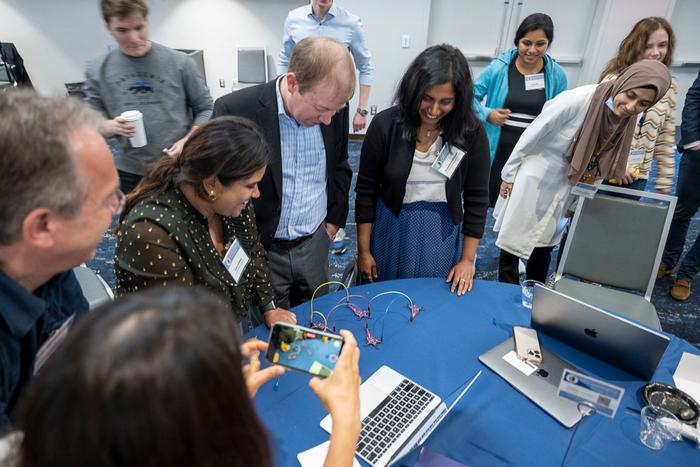UTSA will partner with Texas A&M University to co-lead SECURE Southwest, one of five new regional centers being launched to strengthen U.S. research security.

Credit: The University of Texas at San Antonio
UTSA will partner with Texas A&M University to co-lead SECURE Southwest, one of five new regional centers being launched to strengthen U.S. research security.
Under a five-year, $67 million award from the National Science Foundation (NSF), the Safeguarding the Entire Community of the U.S. Research Ecosystem (SECURE) Center aims to strengthen intellectual property and research security by educating members of the research community about security issues and engaging them in a process of collaborative problem-solving.
The center will take a novel, community-based approach to protecting national research, bringing key players together under one virtual roof, including researchers, research administrators and funding agencies. A cohesive, online platform will provide a space where participants can collaborate and co-design security solutions. It will also provide updates about security threats, coordinated responses to those threats and training to increase researchers’ situational awareness and skills.
The project leads hope that the center will shed light on a component of research that has historically been murky and hard to navigate.
“Currently, information is siloed, inconsistent, and changing all the time,” said Lori Schultz, UTSA senior associate vice president for research administration. “The research community needs access to real-time information, resources to ask questions and a place to connect with other institutions doing similar work. NSF calls upon us to conduct ‘principled, international collaboration.’ SECURE is how we realize that vision.”
The center was mandated by the CHIPS and Science Act of 2022 to address growing concerns about international entities accessing U.S. research unethically or unlawfully. This has become a heightened risk as researchers become increasingly collaborative with colleagues around the world. The NSF described the center as a “clearinghouse for information to empower the research community to identify and mitigate foreign interference that poses risks to the U.S. research enterprise.”
Schultz added, “Protecting the work of researchers in the United States is paramount if the nation is going to maintain its global competitiveness. The SECURE Center will play a critical role in ensuring that ideas and intellectual property are protected as American researchers work with collaborators around the world.”
Schultz will serve as co-lead for the southwest region, leading efforts to elicit and incorporate feedback from universities and research organizations across the Southwest. The center will use the feedback to continually design an environment that is responsive to users and reflective of their needs.
Schultz will work alongside co-lead Kevin Gamache, associate vice chancellor and chief research security officer at Texas A&M University. “I am excited to partner with Lori Schultz and UTSA to lead the SECURE Southwest Regional Center,” said Gamache. “The SECURE Center will positively impact our ability to protect this nation’s research enterprise by creating a community that will make security an integral part of the research process.”
The national SECURE Center will be led by the University of Washington, with ten additional higher education institutions across the country engaged in the first phase.
The five regional centers are:
- SECURE West led by the University of Washington
- SECURE Northeast led by Northeastern University
- SECURE Southeast led by Emory University
- SECURE Midwest led by the University of Missouri
- SECURE Southwest co-led by UTSA and Texas A&M
In addition to the institutions leading regional centers, Mississippi State University, the University of Michigan and Stanford University’s Hoover Institution will provide expertise on sensitive research, threat types, geopolitical analysis and international collaboration. The College of Charleston and Mississippi State University, located in the NSF Established Program to Stimulate Competitive Research (EPSCoR) jurisdictions, will ensure that emerging research and minority-serving institutions are included in SECURE Center activities.
While UTSA and Texas A&M University will jointly lead the southwest region, the principal investigator on the project is Mark Haselkorn, a professor at the University of Washington’s Department of Human Centered Design & Engineering (HCDE). Haselkorn directs the Center on Collaborative Systems for Security, Safety, and Resilience (CoSSaR), a research center with experience facilitating creative collaboration and solution design for complex issues and systems.
SECURE co-design experts will guide a collaborative and iterative design process through which researchers and research administrators provide feedback about evolving solutions as they are being developed. This feedback, in turn, will inform further improvements and iterations.
“This award is a radical departure from previous top-down approaches,” said Haselkorn. “NSF is empowering the research community to work together to identify and address its own security issues. This is the best way to achieve adoption and use of those solutions.”
While a goal of the project is to mitigate the threat of IP theft, particularly from foreign entities, the project leaders hope to cultivate an international research community in which global collaboration can still thrive.
“We aim to foster the transparency and openness required by the academic research tradition while balancing the possible security risks to ensure work is protected,” said Schultz.
UTSA has long been recognized as a pioneer in cybersecurity education and research. This new collaboration complements a growing body of security research and scholarship at UTSA. The university is home to multiple centers and institutes devoted to security, including the National Security Collaboration Center, the Cybersecurity Manufacturing Innovation Institute, the Center for Infrastructure Assurance and Security, the Institute for Cyber Security, the Cyber Center for Security and Analytics, as well as the NSF CREST Center for Security and Privacy Enhanced Cloud Computing.
UTSA is one of the few universities in the nation — and the only Hispanic Serving Institution — to hold three National Center of Excellence designations from the National Security Agency and the U.S. Department of Homeland Security in Cyber Defense Education, Cyber Research and Cyber Operations.



